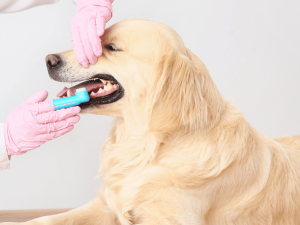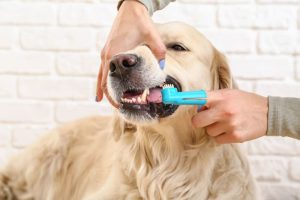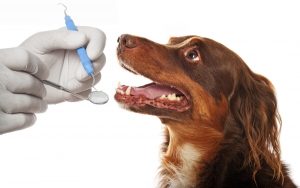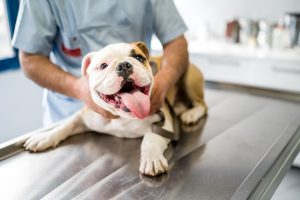Welcome, pet parents, to a topic that’s as vital for our furry friends as it is for us humans: dental care for dogs. Just like us, our canine companions rely on healthy teeth and gums to lead happy and comfortable lives. Yet, dental health is often overlooked in the realm of pet care. So, let’s dive into the world of doggy dentistry and uncover why it’s crucial to keep those pearly whites sparkling.

You see, much like a smile brightens our day, a dog’s dental health plays a significant role in their overall well-being. From enjoying their favorite treats to maintaining proper nutrition, healthy teeth and gums are essential for dogs to lead a full and active life. But beyond the surface-level benefits, good oral hygiene can also prevent a myriad of health issues down the line, ensuring our furry companions stay happy and healthy for years to come.
So, grab a seat, get cozy, and let’s explore the wonderful world of dental care for dogs. Together, we’ll uncover the secrets to maintaining those canine chompers and keeping those tails wagging with joy!
Understanding Canine Dental Health
Anatomy of a Dog’s Mouth:
Dogs possess a unique dental anatomy that serves various functions in their daily lives. A dog’s mouth comprises incisors, canines, premolars, and molars, each serving a specific purpose in chewing, tearing, and grinding food. Additionally, dogs have gums that hold their teeth in place and protect the roots from damage.
Significance of Dental Health:
Dental health is paramount for dogs as it directly influences their overall well-being. Just like in humans, poor oral hygiene in dogs can lead to various health issues such as gum disease, tooth decay, and bad breath. Moreover, untreated dental problems can escalate into more severe conditions affecting vital organs like the heart, liver, and kidneys. Therefore, maintaining optimal dental health in dogs is crucial for ensuring their longevity and quality of life.
Signs of Dental Problems:
Bad Breath:
One of the most noticeable signs of dental problems in dogs is persistent bad breathing, also known as halitosis. This odor often indicates the presence of bacteria in the mouth, which can result from plaque buildup, tartar accumulation, or underlying dental conditions.
Swollen Gums:
Swelling or inflammation of the gums, also known as gingivitis, is another common indication of dental problems in dogs. Healthy gums should appear pink and firm, but if they appear red, swollen, or bleed easily, it may signal the presence of gum disease or infection.
Difficulty Chewing:
Dogs experiencing dental discomfort may exhibit reluctance or difficulty chewing their food. They may avoid certain types of food, chew only on one side of their mouth, or drop food while eating. This behavior may indicate pain or discomfort associated with dental issues such as tooth decay, abscesses, or broken teeth.
Importance of Regular Check-ups:

Regular dental check-ups with a veterinarian are essential for detecting and addressing dental problems early on. During these check-ups, the veterinarian can examine your dog’s teeth and gums, perform dental cleanings if necessary, and provide recommendations for at-home dental care. Additionally, pet owners should monitor their dog’s oral health regularly and seek veterinary attention if they notice any changes or abnormalities.
Preventive Dental Care:
Regular Teeth Brushing:
One of the most effective ways to maintain your dog’s dental health is by brushing their teeth regularly. Using a dog-specific toothbrush and toothpaste, gently brush your dog’s teeth several times a week to remove plaque and tartar buildup. Establishing a routine from a young age can help your dog become accustomed to teeth brushing and ensure optimal oral hygiene.

Dental Chews:
Dental chews are specially formulated treats designed to promote dental health in dogs. These chews typically have a textured surface that helps remove plaque and massage the gums while your dog chews. Offering dental chews as occasional treats can complement your dog’s oral care routine and provide additional support for healthy teeth and gums.
Appropriate Toys:
Choosing the right toys for your dog can also contribute to their dental health. Opt for toys that encourage chewing and gnawing, such as rubber or nylon chew toys. These toys can help remove plaque and tartar, strengthen jaw muscles, and relieve boredom. Avoid toys that are too hard or abrasive, as they may cause damage to your dog’s teeth.
Establishing a Dental Care Routine:
To establish a dental care routine for your dog, start by gradually introducing teeth brushing and dental chews into their daily regimen. Use positive reinforcement and rewards to make the experience enjoyable for your dog. Consistency is key, so aim to brush your dog’s teeth several times a week and offer dental chews regularly. Additionally, schedule regular veterinary check-ups to monitor your dog’s dental health and address any issues promptly.
By incorporating these preventive measures into your dog’s routine, you can help maintain their dental health and prevent dental problems in the future.
Proper Brushing Technique:
Selecting the Right Toothbrush and Toothpaste:
Choose a toothbrush specifically designed for dogs, as human toothbrushes may be too abrasive or difficult to maneuver in your dog’s mouth. Opt for a soft-bristled toothbrush with a long handle for easy access to all areas of your dog’s mouth. Additionally, select a toothpaste formulated for dogs, as human toothpaste contains ingredients that may be harmful if swallowed. Dog toothpaste comes in a variety of flavors, such as poultry or peanut butter, to make the experience more enjoyable for your dog.
Introducing Your Dog to Tooth Brushing:
Before introducing your dog to tooth brushing, allow them to sniff and investigate the toothbrush and toothpaste to familiarize themselves with the objects. Once your dog is comfortable, apply a small amount of toothpaste to the toothbrush and gently lift your dog’s lips to expose their teeth and gums. Begin brushing in a circular motion, focusing on the outer surfaces of the teeth where plaque and tartar tend to accumulate. Use gentle pressure and avoid brushing too aggressively to prevent discomfort or injury to your dog’s gums.
Patience and Consistency:
Introducing your dog to tooth brushing may take time and patience, especially if they are not accustomed to the process. Start slowly and gradually increase the duration of each brushing session as your dog becomes more comfortable. Offer praise and rewards throughout the process to reinforce positive behavior and make tooth brushing a positive experience for your dog. Aim to brush your dog’s teeth several times a week to maintain their dental health and prevent oral problems.
By following these steps and demonstrating patience and gentleness, you can effectively brush your dog’s teeth and contribute to their overall dental health and well-being.
Dental Treatments and Products:

Dental Rinses:
Dental rinses for dogs are formulated to help reduce plaque and tartar buildup, freshen breath, and promote overall oral hygiene. These rinses often contain ingredients such as enzymes or antimicrobial agents that help break down plaque and bacteria. They are typically applied directly to your dog’s teeth and gums using a spray or applicator.
Water Additives:
Water additives are liquids designed to be added to your dog’s drinking water to help prevent dental problems. These additives often contain ingredients like enzymes or chlorhexidine, which can help reduce plaque and tartar formation and maintain oral health. Simply add the recommended amount of water additive to your dog’s water bowl each time you refill it.
Dental Wipes:
Dental wipes are convenient and easy-to-use wipes that are designed to help remove plaque and food debris from your dog’s teeth and gums. They are typically made from soft, textured material that is gentle on your dog’s mouth. Dental wipes are a great option for dogs who may not tolerate traditional tooth brushing or for quick touch-ups between brushings.
Professional Dental Cleanings:
Regular dental cleanings performed by veterinarians are an essential part of maintaining your dog’s oral health. During a professional dental cleaning, your veterinarian will remove plaque and tartar buildup from your dog’s teeth, polish their teeth to smooth out any rough surfaces, and conduct a thorough oral exam to check for any signs of dental disease or other oral health issues. Professional dental cleanings may require sedation or anesthesia to ensure your dog’s safety and comfort during the procedure.
Regular Dental Exams:
In addition to professional dental cleanings, it’s important to schedule regular dental exams for your dog with a veterinarian. These exams allow your veterinarian to assess your dog’s oral health, identify any potential dental issues early on, and recommend appropriate treatments or preventive measures. Your veterinarian may also provide guidance on at-home dental care routines and recommend dental products tailored to your dog’s specific needs.
By exploring various dental treatments and products for dogs and highlighting the benefits of professional dental cleanings and regular dental exams, pet owners can take proactive steps to ensure their dog’s oral health and well-being.
Diet and Nutrition for Dental Health:
Role of Diet in Dental Health:
Diet plays a crucial role in maintaining your dog’s dental health. The type of food your dog consumes can have a significant impact on their oral hygiene. Dry kibble or dental-specific dog food formulas are often recommended over wet or canned food because they are less likely to stick to the teeth and contribute to plaque buildup.
Impact of Food Choices on Oral Hygiene:
Certain food choices can contribute to dental problems in dogs, such as excessive consumption of sugary treats or table scraps. These foods can promote the growth of harmful bacteria in the mouth and increase the risk of dental problems such as tooth decay and gum disease. Instead, opt for high-quality dog food that is formulated to support dental health and avoid feeding your dog human foods that are high in sugar or fat.
Dental-Friendly Diet Options:
There are several dental-friendly diet options available for dogs that can help promote oral hygiene and reduce plaque buildup. Look for dog food formulas that are specifically designed to support dental health, such as those formulated with ingredients that help scrape plaque off the teeth as your dog chews. Additionally, consider incorporating dental chews or treats into your dog’s diet, as these can help remove plaque and tartar while satisfying your dog’s natural chewing instincts.
Recommendations for Dental Treats:
When selecting dental treats for your dog, choose options that are approved by veterinary professionals and formulated to promote oral hygiene. Look for treats that are designed to be chewed for an extended period, as this can help mechanically remove plaque from the teeth. Avoid treats that are high in sugar or contain artificial additives, as these can contribute to dental problems rather than prevent them.
By understanding the role of diet and nutrition in maintaining your dog’s dental health and selecting dental-friendly diet options and treats designed to promote chewing and reduce plaque buildup, you can help support your dog’s oral hygiene and overall well-being.
Addressing Dental Problems:
Guidance on Dental Care:
Addressing dental problems in dogs requires proactive steps to ensure their oral health is maintained. Veterinary professionals recommend regular dental check-ups to monitor for any signs of dental problems and to address them promptly.
Dental Scaling:
One common procedure for addressing dental problems in dogs is dental scaling, also known as professional teeth cleaning. During dental scaling, the veterinarian will remove plaque and tartar buildup from the teeth, both above and below the gumline, using specialized tools. This procedure is typically performed under anesthesia to ensure thorough cleaning and minimize discomfort for the dog.
Tooth Extractions:
In cases where dental problems have progressed to the point where extraction is necessary, the veterinarian may recommend tooth extractions. This procedure involves removing severely damaged or infected teeth to relieve pain and prevent further complications. Tooth extractions are performed under anesthesia, and the veterinarian will provide post-operative care instructions to ensure proper healing.
Treatment of Periodontal Disease:
Periodontal disease is a common dental problem in dogs that can lead to gum inflammation, tooth decay, and even tooth loss if left untreated. Treatment for periodontal disease may involve dental scaling to remove plaque and tartar buildup, as well as antibiotics to address any bacterial infections. In severe cases, surgical intervention may be necessary to repair damaged gums or remove infected teeth.
Importance of Veterinary Care:
It’s essential to seek veterinary care for dental problems in dogs to prevent further complications and ensure proper treatment. Veterinarians have the expertise and resources to diagnose and treat dental problems effectively, helping to relieve pain and improve your dog’s overall quality of life.
By addressing dental problems promptly and seeking veterinary care when necessary, pet owners can help maintain their dog’s oral health and prevent further complications down the line.
Lifestyle Factors and Dental Health:
Age and Dental Health:
Age can play a significant role in a dog’s dental health. As dogs age, they may be more prone to dental problems such as tartar buildup, gum disease, and tooth decay. Therefore, it’s essential to adjust dental care routines as your dog gets older to address any age-related dental concerns and maintain optimal oral hygiene.

Breed and Dental Health:
Different dog breeds have varying susceptibilities to dental problems. Some breeds may be predisposed to dental problems due to factors such as the shape of their jaw or the alignment of their teeth. Brachycephalic breeds, for example, may be more prone to dental crowding, while toy breeds may be more susceptible to periodontal disease. Understanding your dog’s breed-specific dental needs can help tailor their dental care routine accordingly.
Chewing Habits and Dental Health:
Chewing habits can also influence a dog’s dental health. Dogs that enjoy chewing on hard objects, such as toys or bones, may benefit from the mechanical action of chewing, which can help remove plaque and tartar from their teeth. However, it’s essential to choose appropriate chew toys that are safe for your dog’s teeth and to monitor their chewing habits to prevent dental injuries or damage.
Adapting Dental Care Routines:
To maintain your dog’s dental health, it’s essential to adapt dental care routines to suit their individual needs and preferences. This may involve incorporating dental chews or treats into their diet, using toothbrushes and toothpaste specifically designed for dogs, and scheduling regular dental check-ups with your veterinarian. By tailoring dental care routines to your dog’s lifestyle factors, you can help promote optimal oral hygiene and prevent dental issues from developing.
Consulting with Your Veterinarian:
If you’re unsure how lifestyle factors may be impacting your dog’s dental health or how to adapt their dental care routine accordingly, don’t hesitate to consult with your veterinarian. Veterinarians can provide personalized advice based on your dog’s age, breed, chewing habits, and overall health status, helping you develop an effective dental care plan tailored to your dog’s individual needs.
By considering lifestyle factors and adapting dental care routines accordingly, pet owners can help promote optimal dental health for their dogs and ensure their furry companions enjoy healthy teeth and gums throughout their lives.
Tips for Maintaining Dental Health at Home:
1.Regular Brushing:
One of the most effective ways to maintain your dog’s dental health at home is by establishing a regular brushing routine. Use a toothbrush and toothpaste specifically designed for dogs, and aim to brush your dog’s teeth several times a week, if not daily. Start slowly and gradually introduce your dog to tooth brushing, using positive reinforcement to make the experience more enjoyable for them.
2. Providing Dental-Friendly Toys:
In addition to regular brushing, providing your dog with dental-friendly toys can help promote good oral hygiene. Chew toys and dental chews designed to encourage chewing can help remove plaque and tartar from your dog’s teeth, reducing the risk of dental problems such as gum disease and tooth decay. Choose toys that are safe for your dog’s teeth and supervise their chewing to prevent any accidents or injuries.
3. Scheduling Routine Veterinary Exams:
Routine veterinary exams are essential for maintaining your dog’s overall health, including their dental health. During these exams, your veterinarian will assess your dog’s teeth and gums, looking for signs of dental problems such as tartar buildup, gum disease, or tooth decay. They may also perform professional dental cleanings as needed to remove plaque and tartar from your dog’s teeth and ensure their oral health is in optimal condition.
4. Encouraging Consistency and Diligence:
Consistency and diligence are key when it comes to maintaining your dog’s dental health at home. Make dental care a regular part of your dog’s grooming routine, and be consistent in your efforts to brush their teeth, provide dental-friendly toys, and schedule routine veterinary exams. By prioritizing your dog’s dental health and staying diligent in your efforts, you can help prevent dental problems and ensure your dog enjoys healthy teeth and gums throughout their life.
By following these tips and recommendations for maintaining dental health at home, pet owners can play an active role in promoting optimal oral hygiene for their dogs and supporting their overall health and well-being.

Conclusion:
Maintaining proper dental care for dogs is not just about ensuring fresh breath and a sparkling smile; it’s a crucial aspect of their overall health and well-being. By prioritizing your dog’s dental health, you’re taking proactive steps to prevent potentially serious dental issues that can impact their quality of life.
Regular dental care, including brushing their teeth, providing dental-friendly toys, and scheduling routine veterinary exams, plays a vital role in preventing dental problems such as gum disease, tooth decay, and bad breath. By incorporating these practices into your dog’s daily routine, you’re not only promoting healthy teeth and gums but also supporting their overall health and longevity.
As responsible pet owners, it’s essential to prioritize our dog’s dental health and take proactive measures to maintain it. By following the tips and recommendations outlined in this guide, you can ensure that your dog enjoys healthy teeth and gums for years to come.
So, let’s make dental care a top priority for our furry friends and give them the gift of a lifetime of happy smiles and wagging tails.